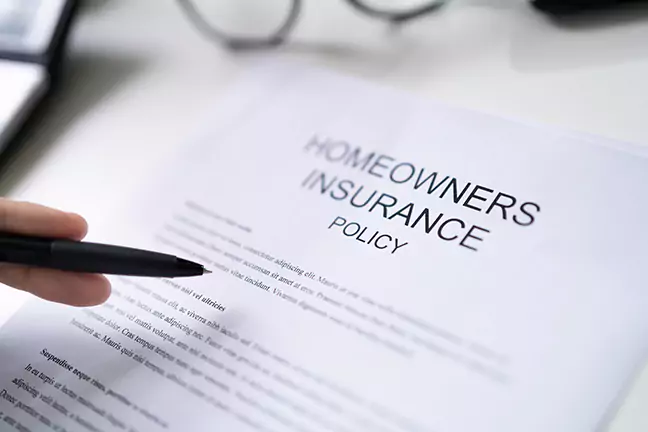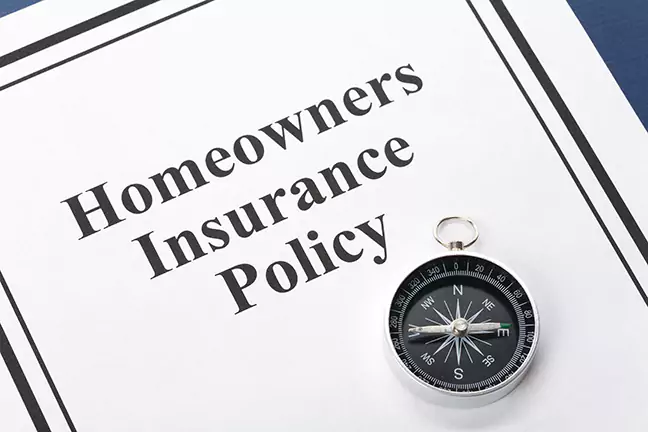A home is a valuable asset and one that most people work hard to invest in for years. Homeowners insurance is a vital financial tool to protect that investment.
Like most insurance products, homeowners insurance protects from financial losses you incur due to an unexpected, accidental, or unplanned event. Even if you work hard to keep your home in perfect condition, you cannot protect it from some events, like a lightning strike that causes a fire or a person falling and suffering an injury.
What Are Homeowners Insurance Policies?
A homeowners insurance policy is a type of legally binding contract you enter into with an insurance provider. You pay a set amount of money for a set length of time. This is called the premium. When paid, the company promises to provide insurance coverage for your home. That means if a covered event, called a peril, occurs, the insurance company helps you to make repairs or pays you for the losses you have. It is a type of financial protection that can be vitally important to protect against threats.
What Is Included in a Home Insurance Plan?
Home insurance policies can be versatile and include various types of protection. However, most have specific coverage that protects you from risks. Here are several main components of this coverage:
Insurance coverage for the structure
This type of coverage protects from losses related to the structure of the home. If there is a fire or someone vandalizes the home, this component of your home insurance policy will cover the repairs or cleanup, depending on the details presented. Most typical policies will cover all attached structures and some detached structures if you name them in the policy.
Personal property coverage
Your insurance policy also covers the personal property within your home. You can choose how much you want your homeowner’s insurance to cover based on the value of your belongings. This policy may cover your home’s furniture, the personal property you own and store at the home, computers, and collections. Determine the value of your personal belongings to ensure you purchase enough coverage to replace your items if lost.
Personal liability insurance
Another component of homeowners insurance is personal liability insurance, which protects you from claims made against you. If someone comes into your home and falls, suffering a medical emergency, liability insurance could cover the costs you are responsible for. It can also cover dog bites that your pet causes to others. Liability coverage protects you from claims made against you and those living in your home.
Flood insurance
Not all insurance policies include flood insurance. If you live in an area with high flood risk, you’ll need this specific add-on feature that protects your home from flooding or water that comes into the home from outside. Most homeowners’ insurance policies do not cover this outright, only flooding caused by backed-up drains or burst pipes.

Homeowner's Insurance and Mortgage Companies
If you have a mortgage on your home, your mortgage company will require that you maintain at least enough homeowner’s insurance to cover the value of your mortgage. Because your lender is taking on a risk by funding the loan for you, they require that you have protection on the structure so they can recoup the loss if the home is a total loss. Purchasing coverage is often a requirement to obtain a mortgage.
Actual Cash Value Versus Replacement Value
You have several options available when choosing a home insurance policy. Two key factors to consider are actual cash value and replacement value.
If you have a fire in your home, you expect the insurance company to pay you for the losses you have. However, carefully think about what you expect to be paid.
Replacement cost is one option. With replacement cost coverage, you are paid the cost to purchase the lost item at today’s dollar. That means that no matter what it costs to buy the same type of item today, the insurance company will pay you that value.
Actual cash value pays the value of the item at the time of the incident. That may not be enough to replace the item.
For example, let’s say your homeowner’s insurance covers the replacement of a stolen computer. The computer may only be worth $300 now because it is older and used. However, to buy a new one, you would need to spend $600. If you have replacement cost coverage, your homeowner’s insurance covers that $600. If not, then it will only pay the value just before the item was stolen. A replacement cost policy may be best in this situation.
What Does Homeowners Insurance Cover?

When purchasing a homeowners insurance policy, it is critical that you learn exactly what the policy includes and what it excludes. There are numerous types of policy options available, and most insurance agents will help you choose one that fits your needs.
Consider what the standard homeowners’ insurance policy includes based on the various parts of it:
Coverage A: This refers to the structure coverage, called the dwelling coverage
Coverage B: This includes any additional structures on the property, which are typically named, like sheds, fences, and detached garages
Coverage C: This includes your personal property, including the contents of any of the structures listed in the policy
Coverage D: This component covers your costs if you have to move out of your home for repairs to be done due to a covered peril, and is often called additional living expenses
Coverage L: Personal liability insurance which protects you from claims others make against you
Coverage M: This is medical payments coverage, which covers the cost of medical bills if someone is hurt on your property
From here, policies are broken down further with more features. Here’s a quick look at some of those details:
HO-1: This is the Basic Form of home insurance. It covers only things that are named perils, meaning it only covers specific losses named on the policy. Typically, this basic form of homeowners insurance covers vandalism, hail and windstorm damage, explosions, fire, smoke, lightning, damage from vehicles or aircraft, riots, civil commotion, and theft.
HO-2: This is Broad Form insurance, which means it covers everything in HO-1 but also tends to include personal belongings, and some may include personal liability.
HO-3: Special Form insurance that is an open-peril policy. That means it covers everything that happens to the home except specific named perils.
Additional options are available as well.
For more clarity >>> Understanding Homeowners Insurance Terms: A Glossary for New Immigrants
What to Consider When Purchasing Homeowners Insurance
Most people need at least basic homeowners insurance that fits the following:
Provides enough coverage to meet the mortgage lender’s requirements
Covers personal property value in the home
Provides personal liability protection
Covers the cost of rebuilding the home (not just the current market value of the home)
Includes medical payments and additional living expenses coverage
From here, consider adding additional coverage. If you have very valuable assets, like electronics, jewelry, or other items that are very valuable, you may wish to increase your coverage limits or purchase a separate policy to cover those items. Many insurance companies will have per-item limits that play a role in how much value you can claim.
Resources to Compare Homeowners Insurance
Your Home’s Structure Is a Valuable Asset
For immigrants looking to secure their new homes in a new country, it’s crucial to ensure you have the right homeowners insurance to protect your property and possessions. Homeowners insurance policies can vary greatly in coverage and cost, so it’s important to compare quotes from multiple providers to find the best deal that suits your needs.
Several websites offer comprehensive comparison tools to help you evaluate different insurance policies easily. Here are some recommended sites where you can start your search:
- Insurify: A user-friendly platform that allows you to compare multiple insurance quotes quickly.
- NerdWallet: Provides detailed comparisons and reviews of homeowners insurance policies, helping you make an informed decision.
- Policygenius: Offers a clear comparison of policies from various insurers, along with advice on the best options for your needs.
- QuoteWizard: Helps you find the most competitive rates by comparing quotes from several insurance providers.
Each of these websites can provide valuable insights into the different coverage options and premiums available, helping you to make the best choice for your home insurance needs.
Protect Your Home and Your Family with Homeowners Insurance
Homeowners insurance covers the unexpected losses that can occur to anyone’s home. Choosing a policy that is both affordable and comprehensive enough to protect you and provide adequate property insurance in the event of a fire, theft, or natural disaster is critical. It’s a good personal finance strategy to have a policy like this in place to alleviate the risk of total loss.

